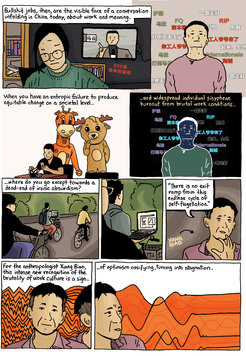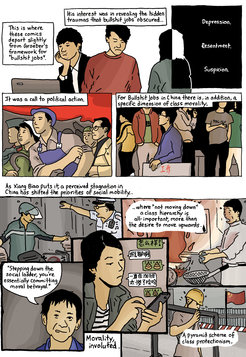Anthropology Meets Comics
Biao Xiang, Director of the Department ‘Anthropology of Economic Experimentation: Frontiers of Transformation’, was recently featured in a popular comic. Titled Bullshit Jobs (in China) the zine collects a series of web comics by Krish Raghav, along with a theoretical postscript reflecting on the origins of widespread stress and disillusionment among Chinese youth about their working lives.


The comic cites an interview that Xiang gave on the Chinese media platform The Paper (23 Oct 2020), which has been read hundreds of thousands of times and is available in English on the sister platform The Sixth Tone (https://www.sixthtone.com/news/1006391/how-one-obscure-word-captures-urban-chinas-unhappiness). In the interview, Xiang traces the history of the word “involution”, an obscure anthropological concept that has recently become a buzzword in social debates in China. In economic anthropology, involution means that increasing input leads to operations becoming more complicated rather than increasing output, thus resulting in stagnation. Since mid-2020, involution has come to be used in Chinese social media to refer to a constant pressure to perform which, however, does not lead to any tangible improvement in one’s life. Xiang points out that this appropriation of the term should be understood as a creative expression of particular type of anxiety that is widespread among the Chinese youth. This anxiety is due to fierce social competition in which very few can win, yet, “there is no exit ramp from this endless cycle of self-flagellation”, as Xiang is quoted in the comic. Competition for a better life has become a moral obligation. “By stepping down the social ladder, you’re essentially committing a moral betrayal” Xiang explains.
“Biao Xiang’s work really resonated with me because it provided a vocabulary, a frame to understand events that one sees every day” Krish Raghav says. “It connected the dots between disparate everyday experiences, providing a way to make sense of complicated phenomena.” These experiences include, in particular, the “bullshit jobs” (a term popularized by anthropologist David Graeber) featured in the web comic. Xiang’s work, Raghav noted, illuminates “the encounters with class and privilege in Beijing, the language that is trending online when talking about work, and the news we read about labour and working conditions.”
Competition became particularly fierce because, as Xiang points out, different aspects of life – one’s educational achievements, economic status, and marriage prospects – are all closely linked in Chinese society today. The popular criteria in judging what a good life means has become more, rather than less, homogeneous. This not only runs counter to classical sociological theories. According to these theories, differentiation between “spheres of exchange” increases with modernization, which means that different types of goods – for instance basic subsistence goods such as yams versus luxury goods such as fancy clothes – are not exchangeable, and they are instead traded within their own sphere. In many societies, the sphere of subsistence is an area for collaboration, and competition is concentred in the sphere of prestige. But when social competition becomes total, there is no exit.
“I am very encouraged to see anthropological analyses make their way into non-fiction comics”, Xiang says. “Raghav’s popular comic series addresses serious social issues, and making anthropological ideas available in this format will excite more discussions among young people in China.”

